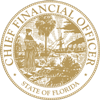Unfortunately, scammers are hard at work attempting to scam you during the COVID-19 pandemic. They are using all forms of contact - telephone, postal mail, email, text messaging and in person - to take advantage of the unsuspecting for financial gain and access to personal or insurance information.
Beware and protect yourself from these COVID-19 fraud schemes and scams:
FTC Fraud Data is updated daily and viewable by location, type of fraud, contact method, payment method and age of victims.
COVID-19 Vaccine
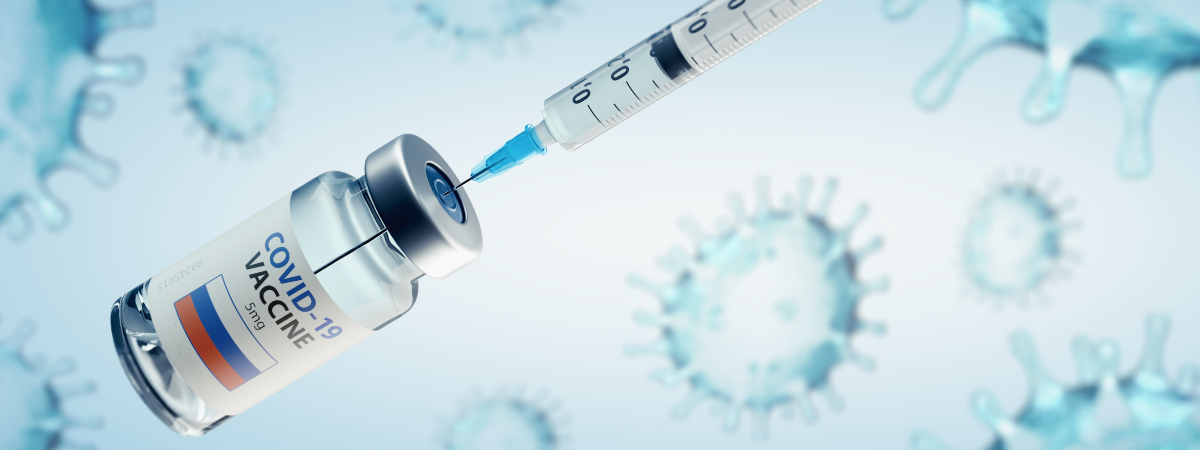
An individual claiming to be a medical professional offers to schedule you to receive the COVID-19 vaccine for a fee. The offer may happen via a phone call, social media or in person at a pop-up vaccination location. The person will require your Medicare, Social Security Number or health insurance information, in addition to a form of payment to provide you with instructions on where to go to receive the vaccine. The vaccination they are offering may not be approved by the FDA to prevent COVID-19 or they may be scheduling you for an appointment at a vaccination location that does not exist.
Consumer Tips:
- Only accept vaccinations from verified licensed medical professionals such as your doctor, pharmacy or the Florida Department of Health. If you have any questions regarding COVID-19 vaccinations or medications being offered, please contact:
Florida Department of Health 24/7 COVID-19 Call Center: 1-866-779-6121
- No matter what anyone tells you, you cannot buy COVID-19 vaccines and there’s no out-of-pocket cost to schedule or receive the vaccine. If someone is demanding payment, they are not a part of the Florida Department of Health or any other official organization. The vaccine is only available at federal- and state-approved locations.
- Ignore online ads, social media posts, or phone calls from people offering to sell you the COVID-19 vaccine.
- Do not give out your personal information or verify details of your insurance coverage to any unsolicited callers or anyone that approaches you in person.
COVID-19 Testing Kits
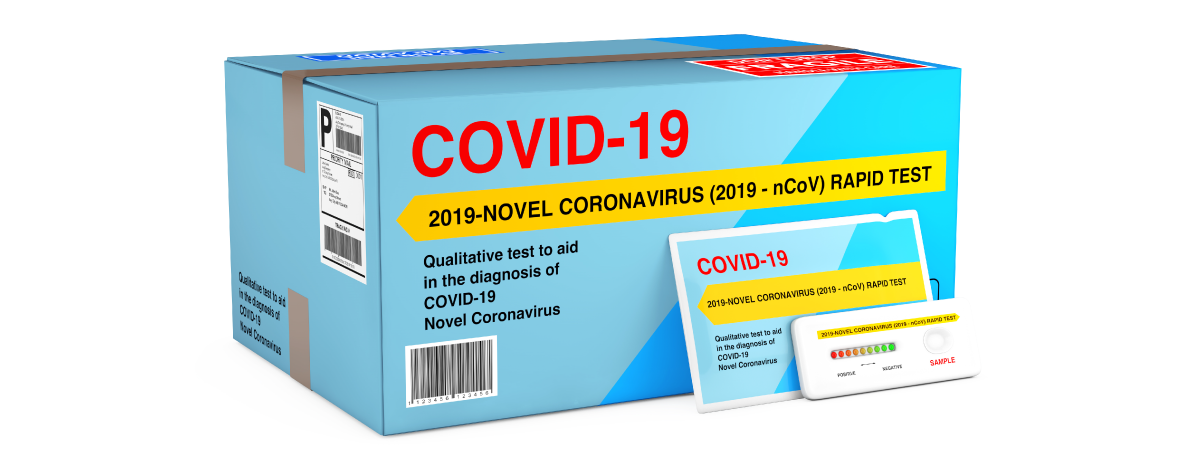
You receive an offer to purchase COVID-19 at-home testing kits through an email, on a website or even on social media. Fake and unauthorized at-home testing kits are appearing online as opportunistic scammers take advantage of the spike in demand. You cannot trust the results from COVID-19 testing kits that have not been approved by the FDA. You may risk unknowingly spreading COVID-19 or not getting treated appropriately if you use an unauthorized test.
Consumer Tips:
When shopping for COVID-19 testing kits online, the Federal Trade Commission recommends:
- Make sure the test you’re buying is authorized by the FDA. Check the FDA’s lists of antigen diagnostic tests and molecular diagnostic tests before you buy to find the tests authorized for home use.
- Research the seller before making any purchases, especially if you’re buying from a site you are not familiar with. Search online for the website, company, or seller’s name plus words like "scam," "complaint," or "review".
- Compare online reviews from a wide variety of websites. You can get a good idea about a company, product, or service from reading user reviews on various retail or shopping comparison sites. Think about the source of the review. Ask yourself: Where is this review coming from? Is it from an expert organization or individual customers?
- Make the purchase using a credit card. If you're charged for an order you never receive, or for a product that's not as advertised, contact your credit card company and dispute the charge.
Report any fraudulent listings to the FTC: ReportFraud.ftc.gov.
Vaccination Card

You receive a phone call or see an ad online offering vaccination cards and negative COVID-19 test results for sale. The individual selling the fake vaccination card and test results will ask for your personal information and payment information in order to complete the transaction. This information may include any of the following: your full name, Social Security Number, health insurance information, credit card information and bank account information.
Scammers are using the pandemic as an opportunity to profit and to gain access to your personal information for identity theft purposes.
Consumer Tips:
- Be aware that purchasing fake vaccination cards, making your own or filling in the blanks of any vaccination information with false information is illegal and you could be fined or face other legal action. The only legitimate way to show proof of your vaccination status is to get vaccinated and maintain the vaccination card issued to you by the state-approved vaccine facility.
- Do not share or confirm your personal, insurance or financial information, including bank account and credit card numbers, with anyone who contacts you.
- To report fake vaccination cards contact:
The U.S. Department of Health and Human Services, Office of Inspector General
1-800-HHS-TIPS
www.OIG.HHS.gov
The FBI's Internet Crime Complaint Center
Vaccination Status on Florida Driver License
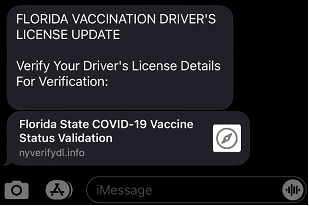
Example of Fraudulent Text Message
You receive a text message requesting you to verify your driver license details in order for your vaccination status to be added to your license. The text message provides a link that sends targets to a spoofed Florida Department of Highway Safety and Motor Vehicles (FLHSMV) website with input boxes requesting Social Security and driver license information—including a place to upload a photocopy of a driver license. The spoofed webpage is not an official state agency site even though the scammers added the FLHSMV logo and the Florida Department of Health logo at the top to trick consumers into sharing their personal information.
If you click on the link in the fraudulent text message and enter your personal information, scammers can then use your identity to open financial accounts without your knowledge.
Consumer Tips:
- The Florida Department of Highway Safety and Motor Vehicles does not interact with consumers through text messages and will never send a text message regarding the status of a driver license, personal details or medical information, including COVID-19 vaccination status.
- Do not share or confirm your personal, insurance or financial information, including bank account and credit card numbers, with anyone who contacts you through text messaging.
- Do not click on links in a text message or email you receive from an unknown sender. Clicking on these links may bring you to a fraudulent website trying to obtain your personal, financial or insurance information. Clicking on unknown links can also download malware onto your device.
- Do not trust the caller ID. While the name and number may appear to be that of a legitimate state agency or organization, it may be a scam artist attempting to obtain your personal information.
- Report suspicious solicitations or COVID-19 vaccine-related advertisements:
Florida Attorney General’s Office
- 1-866-9NO-SCAM (966-7226)
- MyFloridaLegal.com
PROTECT YOUR IDENTITY:
Do not share pictures of your vaccination card on social media. Posting content that includes your date of birth, health care details or other personally identifiable information can be used to steal your identity.

If you lose your vaccination card or need to request your COVID-19 vaccination record:
- Contact the medical provider or the vaccination location that administered your vaccine to find out if they are able to provide replacement proof of vaccination.
- Florida has a free, statewide online immunization system that all medical providers providing vaccinations use called Florida SHOTS.
- Ask your healthcare provider. All providers administering vaccinations have access to Florida SHOTS and can generate your vaccination history from your records.
- Ask your local county health department. If you do not have a healthcare provider, your local county health department can access your vaccination history through Florida Shots.
County Health Departments - Location Finder Resource
Florida Department of Health 24/7 COVID-19 Call Center: 1-866-779-6121 - Submit your request directly to Florida SHOTS. You can request your COVID-19 vaccination records directly from Florida SHOTS by filling out the Florida Department of Health form - DH3203 Authorization to Disclose Confidential Information form online, electronically sign and submit it.
Note: This form is for use only by individuals aged 18 years and over to request their own COVID-19 vaccination record. DO NOT use this form to request records for another individual. Each individual is responsible for their own request. Currently, records of minors (aged 17 years and below) are not available through this request portal. Please contact your healthcare provider or local county health department to request records for a minor.
Contact Tracing Scams
What is contact tracing?
Contact tracing is a vital tool used in slowing the spread of COVID-19 to protect you, your family and your community. When an individual tests positive for COVID-19, contact tracing is the process of identifying everyone the individual has come in contact with to advise those individuals of their possible exposure.
For more information on contact tracing, including a list of official phone numbers used for contact tracing in Florida, please visit the Florida Department of Health COVID-19 Response site or refer to their COVID-19 Contact Tracing Fact Sheet.
Review the consumer tips below to ensure you will be able to spot a contact tracing scam.
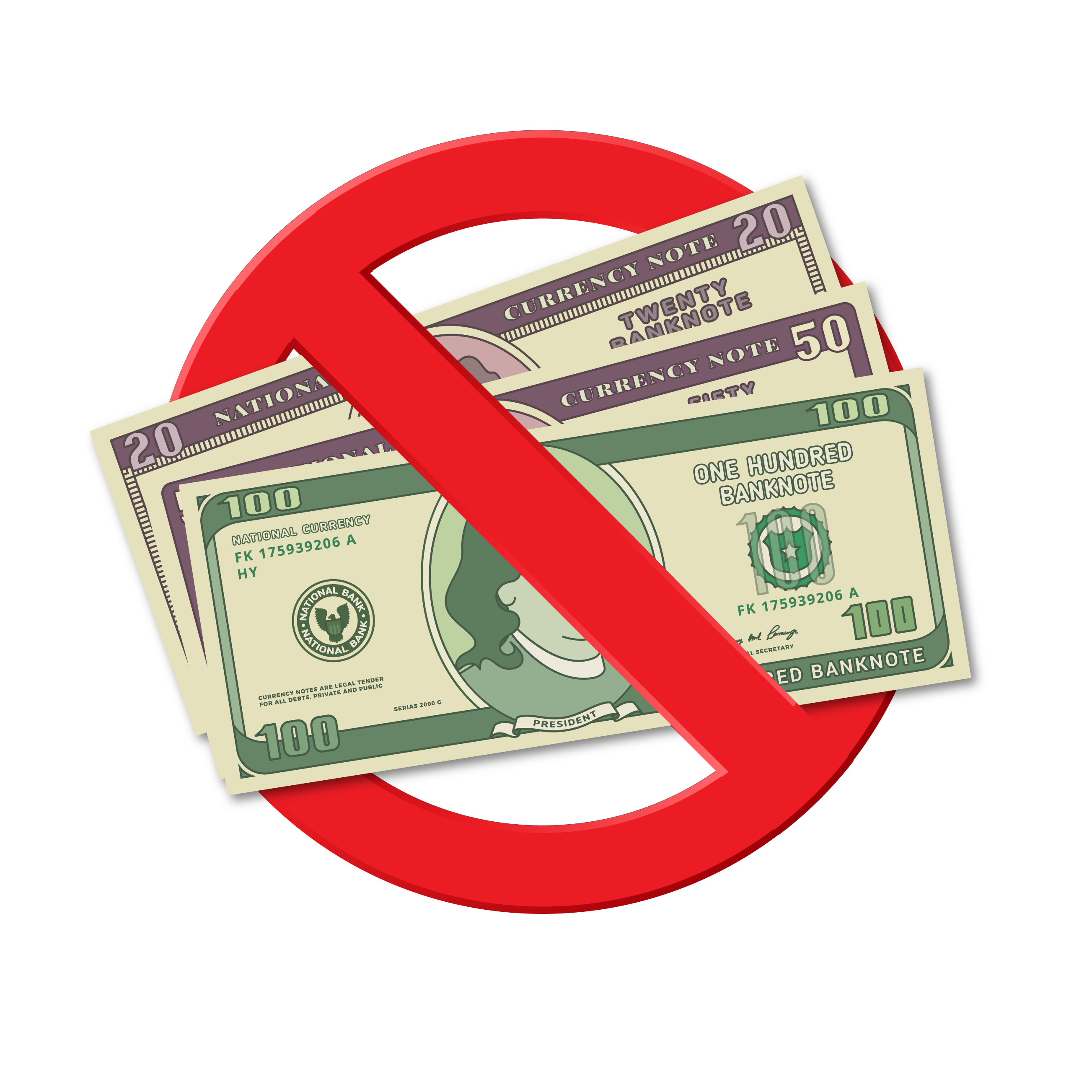
Legitimate contact tracers will not ask you for money.
Contact tracing does not require any form of payment. If someone is demanding payment through a money transfer, gift card or cryptocurrency, they are not a part of the Florida Department of Health or any other official organization.
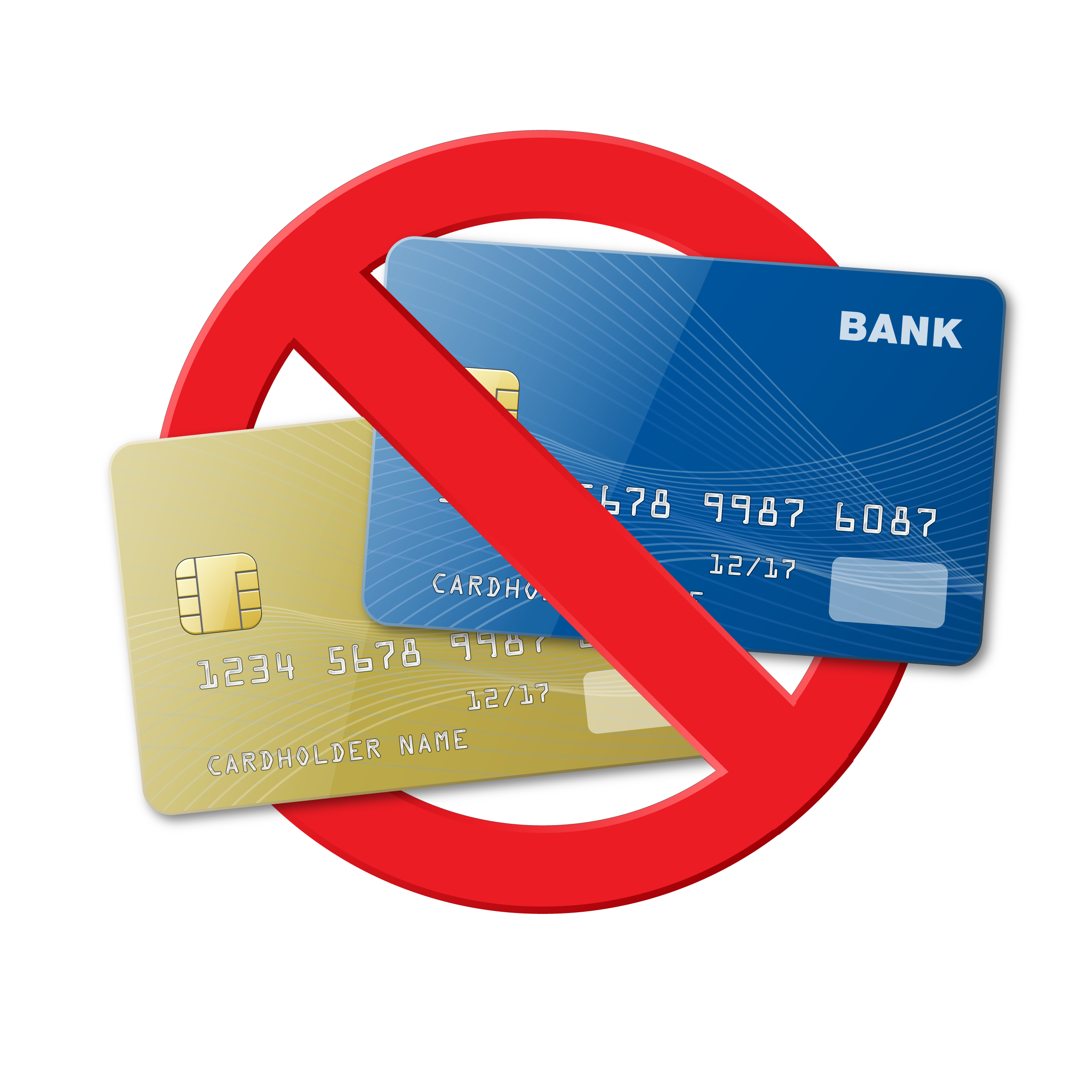
Contact tracing does not require your bank account or credit card information.
Do not share or confirm your personal or financial information, including bank account and credit card numbers, with anyone who contacts you. Contact tracing is a core public health function available at no charge.
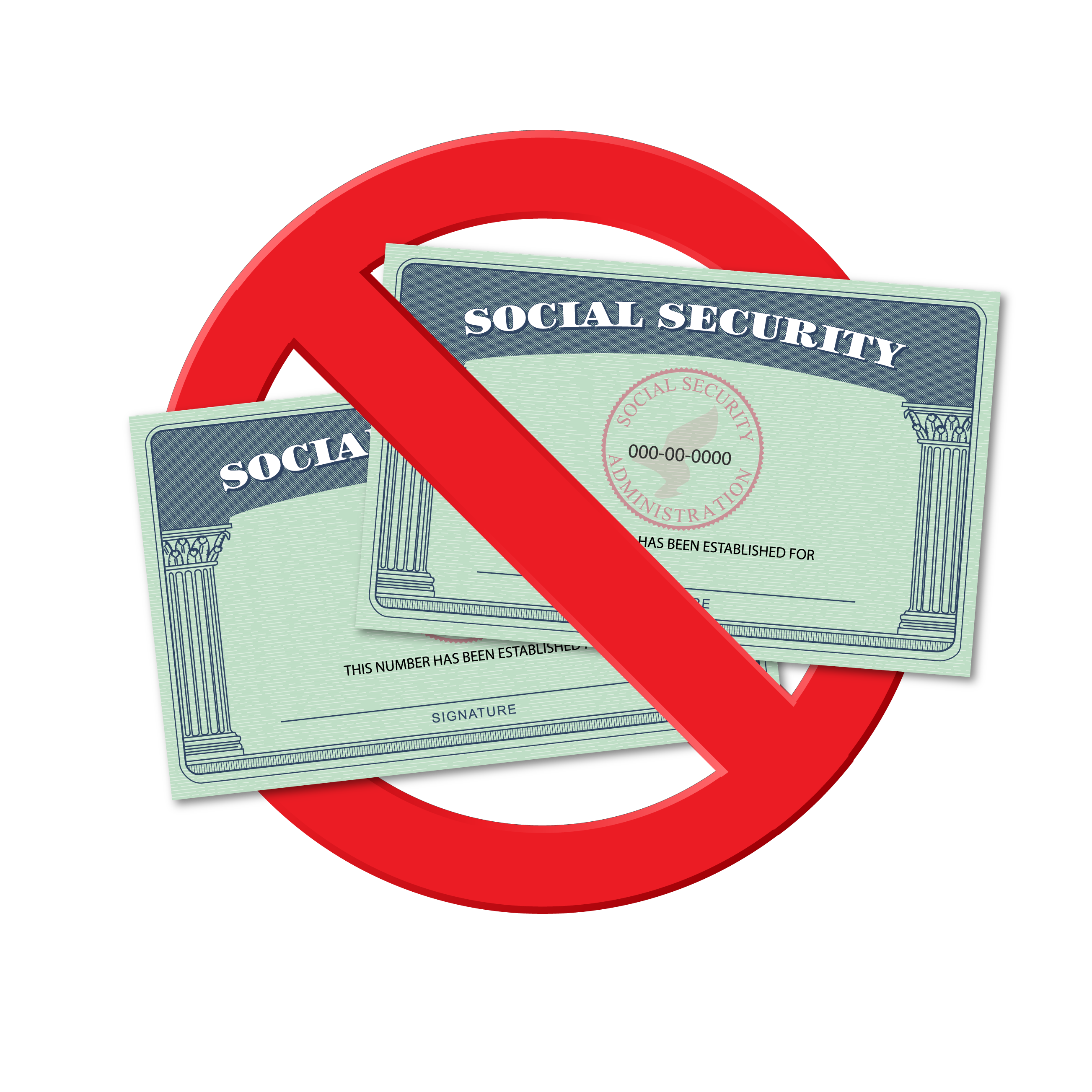
Legitimate contact tracers will never ask for your Social Security number.
You will not need to share your Social Security number in the contact tracing process. Immediately cease any communication with anyone claiming to be a contact tracer that is demanding your Social Security number.
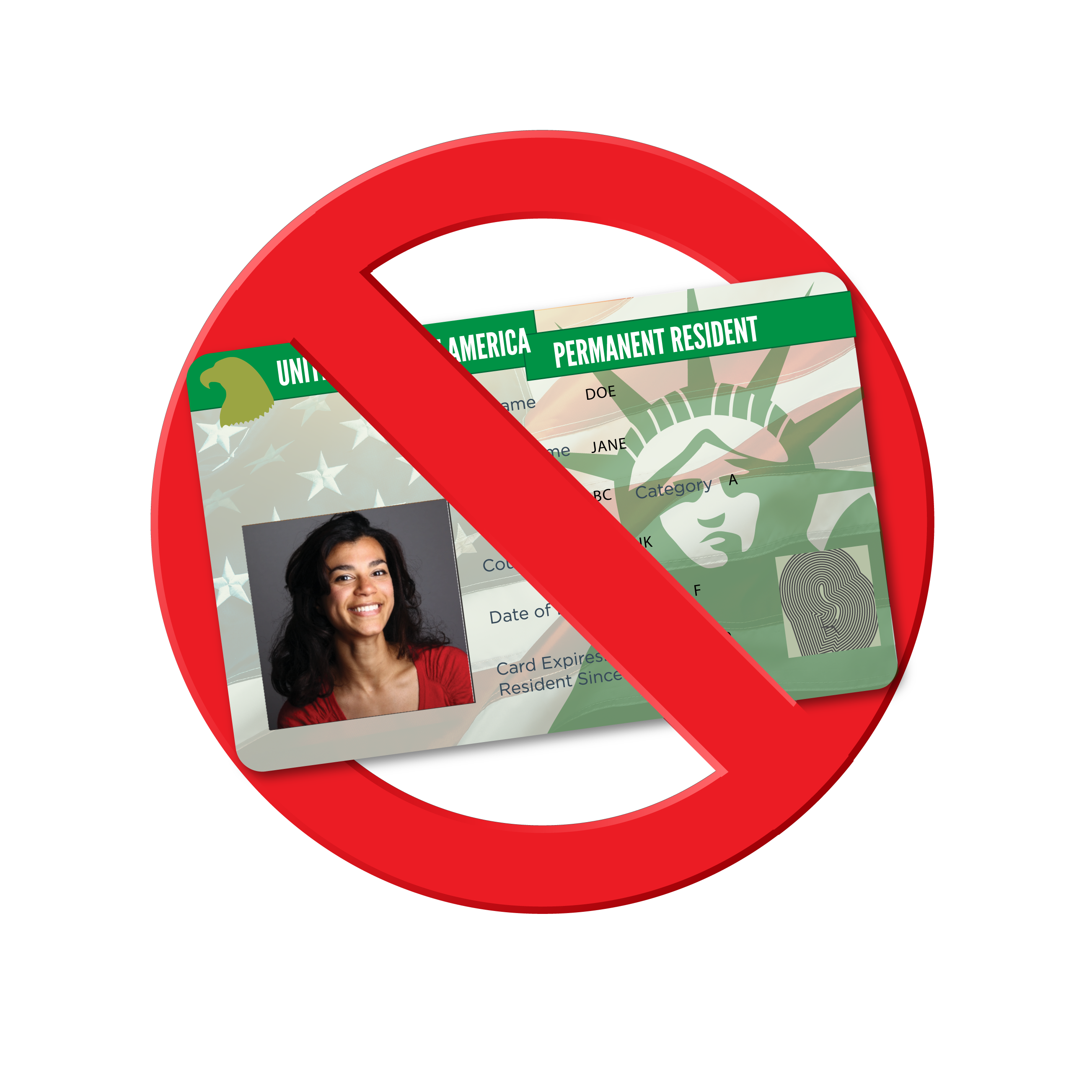
Immigration status is not a part of contact tracing.
Legitimate contact tracers will not inquire about your immigration status or request any documentation associated with it.
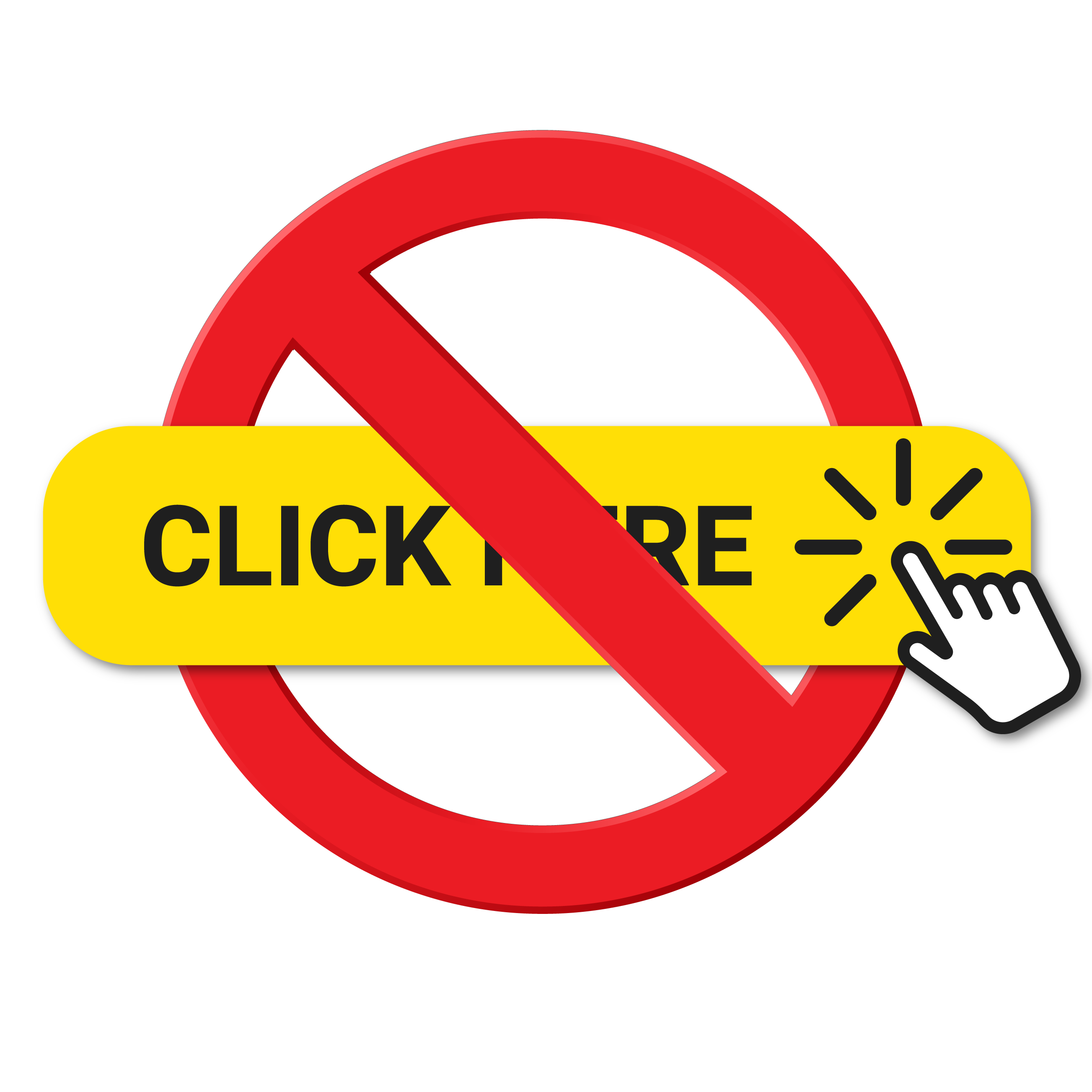
Do not click on a link in a text message or email.
Scammers are including links in fraudulent text messages and emails. Clicking on these links may download malware onto your device or put you at risk for a scammer to gain your personal, financial or insurance information.
To report fake contact tracers:
- Florida Attorney General: 1-866-9-NO-SCAM (866-966-7226) or www.MyFloridaLegal.com
- Federal Trade Commission: https://reportfraud.ftc.gov/#/

Additional COVID-19 Scams
COVID-19 Vaccine Survey
A person contacts you through email or text message requesting you complete a limited-time survey about a COVID-19 vaccine (Pfizer, Moderna, etc.). In exchange, you are offered a free reward but asked to pay for shipping fees before it is sent to you.
Consumer Tips:
- No legitimate survey will ask you to pay for a "free" reward or request your credit card or bank account information. Never give out your personal, financial or health insurance information to anyone who contacts you out of the blue.
- Do not click on any links or open any attachments. Doing so could potentially install harmful malware onto your device or steal your personal information without your knowledge.
- Do not call or text any phone numbers in the email or text message. If you would like to call the company, research a phone number for the entity online.
- If you get an email or text message requesting your personal or financial information and you think it could be a scam, report it to the Federal Trade Commission: ReportFraud.FTC.gov
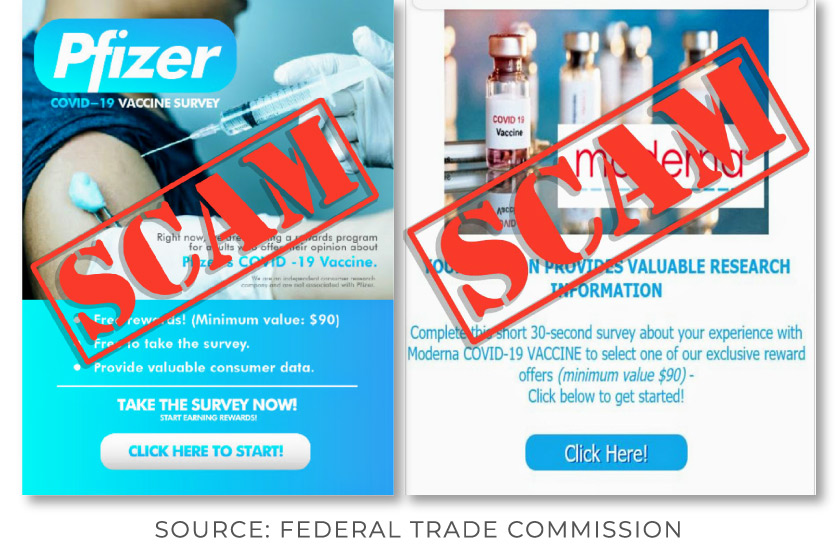
EXAMPLES OF POSSIBLE COVID-19 VACCINE SURVEY EMAILS AND TEXT MESSAGES
To learn more about recognizing and reporting spam text messages, refer to the FTC's guidance here:
How to Recognize and Report Spam Text Messages
Fake Charity

A charity solicits donations to assist those impacted by COVID-19. Your personal financial information will be requested and possibly used to make fraudulent purchases.
Consumer Tips:
- To determine if a charity is legitimate, refer to the Department of Agriculture and Consumer Services' Check-A-Charity resource that lists all charities currently registered with the State of Florida.
Check-A-Charity Resource
www.FDACS.gov/ConsumerServices
1-800-HELP-FLA (435-7352)
- For charity solicitations for an individual or family, do preliminary research to decide if you feel comfortable donating. For example, for fundraisers on GoFundMe, the company offers guidelines and helpful questions to ask to determine a fundraiser’s legitimacy. GoFundMe also offers a method to report a fraudulent fundraiser on their site.
GoFundMe: How to Determine if a Fundraiser is Legitimate
- Do not trust the caller ID. While the name and number may appear to be that of a charity, it may be a scam artist attempting to obtain your personal information.
Low-price Health Insurance
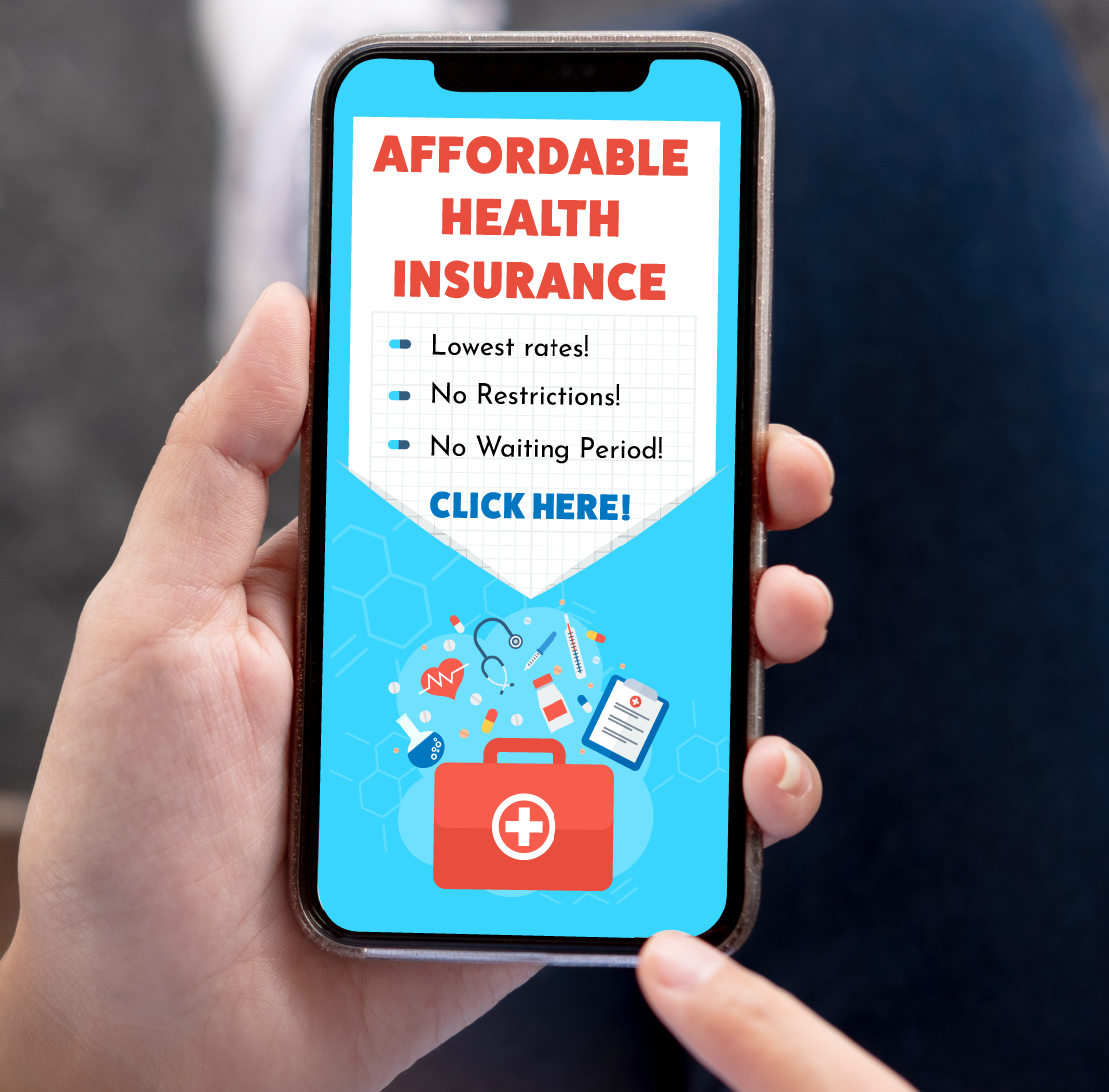
A person claiming to be an insurance agent or company representative contacts you unsolicited via phone, email or social media with an offer of low-price insurance coverage. The scammer may even place advertisements online. The price is typically too-good-to-be-true. You may be required to make a payment immediately and advised that the coverage will become effective instantly. The coverage will not be legitimate, which you may not determine until you attempt to obtain medical services or a claim is filed.
Consumer Tips:
- Only purchase and make changes to your insurance policy through a licensed insurance agent or your insurance company directly. Verify identity before making any payments or providing personal information.
- Be sure that your insurance company or agent is licensed to do business in Florida.
To Verify an Insurance Company License:
Office of Insurance Regulation
Active Company Search
www.FLOIR.com/CompanySearch
To Verify an Insurance Agent License:
Florida Department of Financial Services
Division of Insurance Agent and Agency Services
www.MyFloridaCFO.com/Division/Agents
850.413.3137
- Be leery of unsolicited calls. Companies should not call you unsolicited requesting personal information or ask you to verify details of your insurance coverage.
- Do not give out your personal information or verify details of your insurance coverage to any unsolicited callers or anyone that approaches you in person.
Federal Trade Commission COVID-19 Fraud Data
COVID-19 Resources
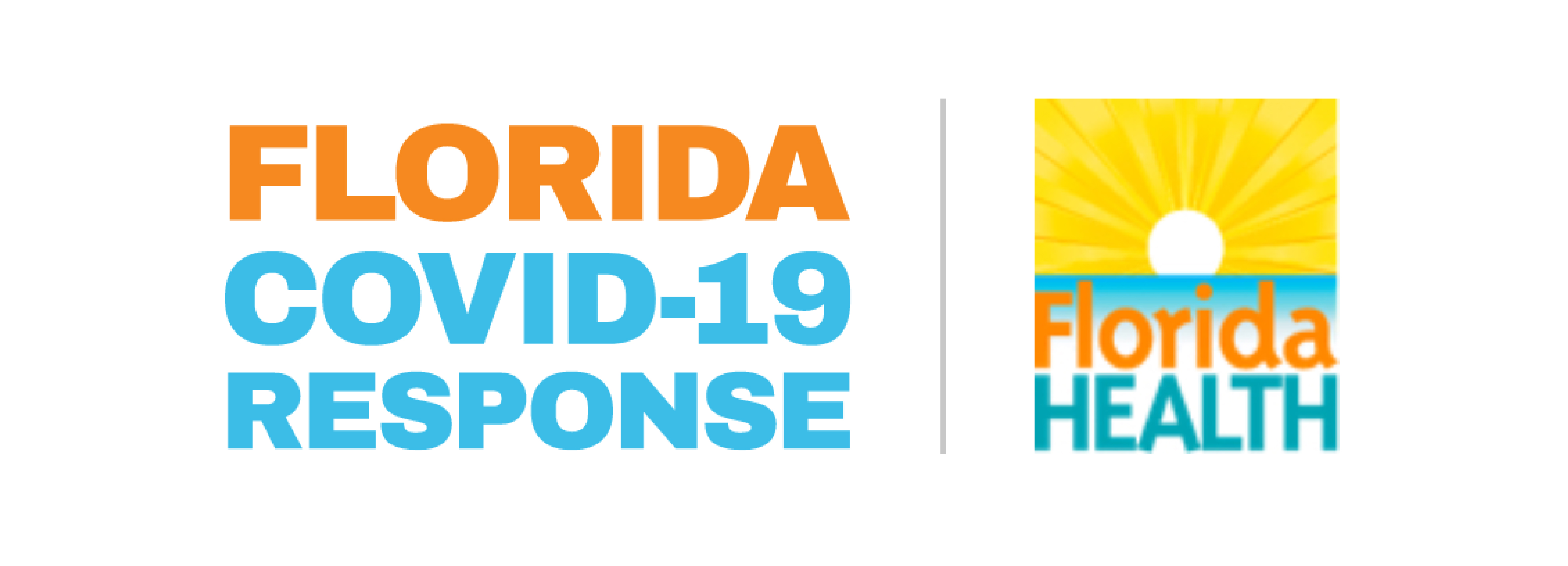
Florida Department of Health
- FloridaHealthCOVID19.gov
- Florida Department of Health 24/7 COVID-19 Call Center: 1-866-779-6121
- County Health Departments - Location Finder Resource
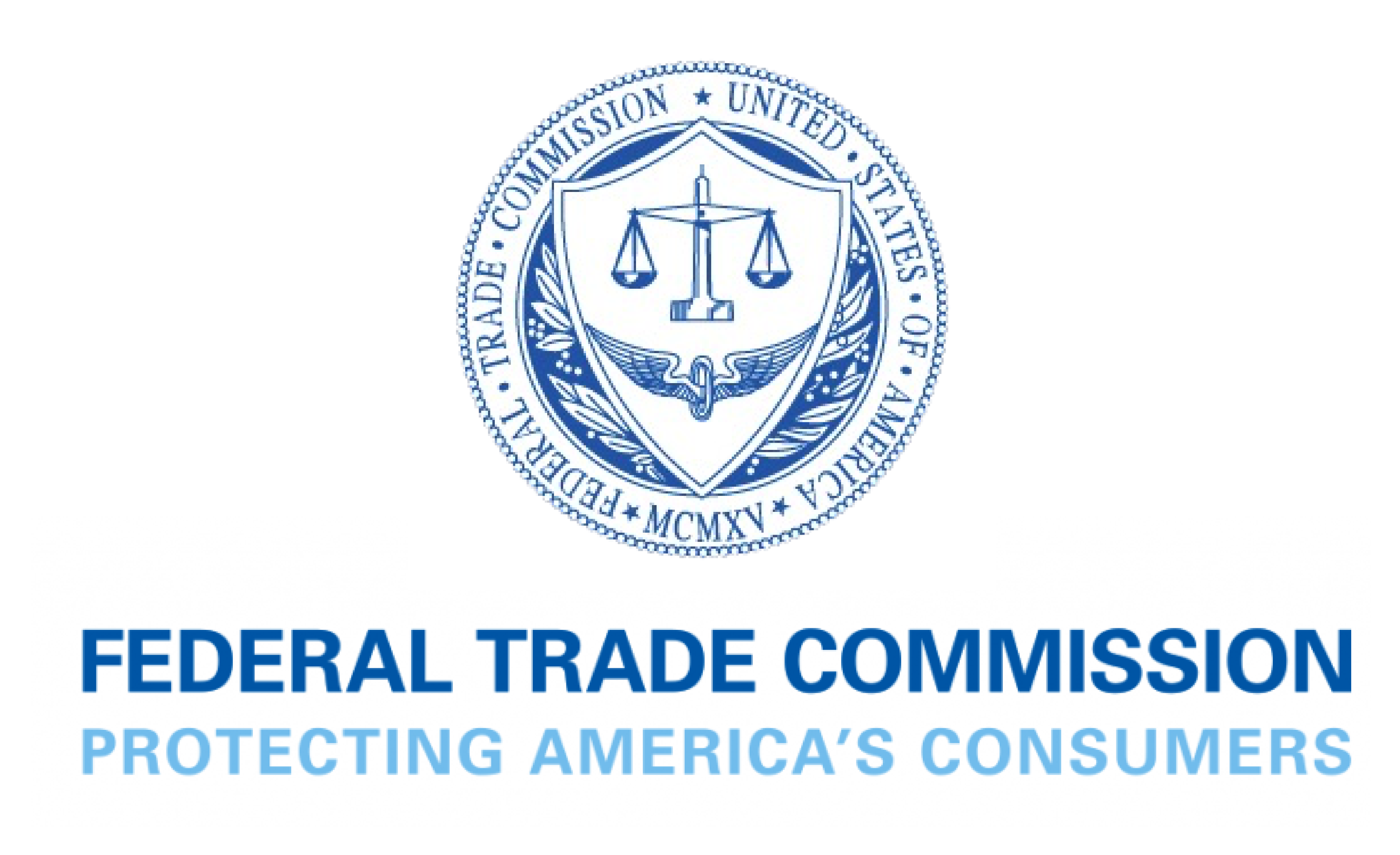
Federal Trade Commission
- Coronavirus Advice for Consumers: www.FTC.gov/Coronavirus/Scams-Consumer-Advice
- Coronavirus Resources: www.FTC.gov/Coronavirus/Resources
Contact Your ICA
Tasha Carter
Florida's Insurance Consumer Advocate
Office of the Insurance Consumer Advocate
200 East Gaines Street, Tallahassee, FL 32399
Phone: (850) 413-5923
Email: YourFLVoice@MyFloridaCFO.com
